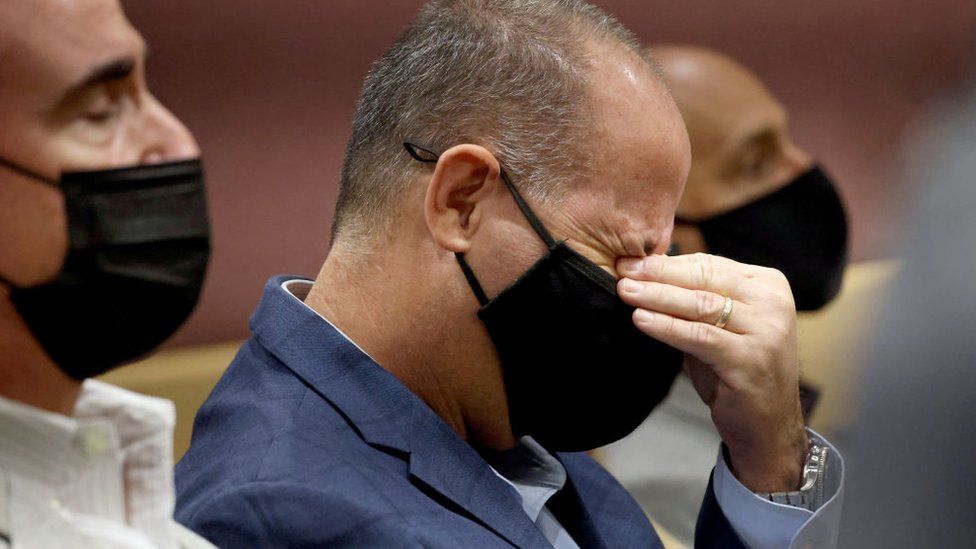
Parkland school shooting: Gunman faces death penalty as trial opens

By Sam Cabral
BBC News
 Image source, Getty Images
Image source, Getty Images
Fred Guttenberg, who lost his daughter Jaime in the 2018 attack, reacts in court last year
A gunman who killed 17 people at his former high school has gone on trial in Florida, with jurors set to decide whether he faces the death penalty or life in prison.
Nikolas Cruz, 23, pleaded guilty last year to 17 counts of first-degree murder over the 2018 Parkland shooting.
As prosecutors seek the death penalty, defence lawyers are pushing for life in prison without parole.
The trial is expected to last four to six months and will be televised.
It is a rare case of a mass shooter appearing before a jury in the US, as they are frequently killed by police or take their own lives. The shooting at Marjorie Stoneman Douglas High School on Valentine’s Day 2018 is also the deadliest to go before a jury in the country.
As prosecutors delivered their opening statement on Monday, many of those gathered in the packed courtroom were visibly emotional. Some families affected by the attack have spoken out publicly in support of a death sentence.
They listened intently, often wiping away tears as lead prosecutor Michael Satz detailed a moment-by-moment account of the shooting. He named each person who was shot and wounded, while one woman exited the courtroom in tears.
Mr Satz said he would show the court the murders had been “cold, calculated and premeditated”. He recounted how the attacker, then 19, had vowed to become the “next school shooter” in a video filmed just days before.
“I’m going to speak to you about the unspeakable, about this defendant’s goal-directed, planned, systematic murder,” he said.
As the prosecutor spoke, the defendant – who wore a dark jumper and a black face mask – looked down at a notepad, occasionally scribbling in it and turning to his lawyers.
The defence team, however, did not deliver an opening statement.
It has been more than four years since the gunman stormed a building of Stoneman Douglas – from which he had been expelled – while carrying more than 300 rounds of ammunition.
Some 14 students and three teachers were killed. They were:
- Alaina Petty, 14;
- Alex Schachter, 14;
- Alyssa Alhadeff, 14;
- Gina Montalto, 14;
- Cara Loughran, 14;
- Jaime Guttenberg, 14;
- Martin Duque, 14;
- Luke Hoyer, 15;
- Peter Wang, 15;
- Carmen Schentrup, 16;
- Helena Ramsay, 17;
- Joaquin Oliver, 17;
- Nicholas Dworet, 17;
- Meadow Pollack, 18;
- Scott Beigel, 35;
- Aaron Feis, 37; and,
- Christopher Hixon, 49.
Prosecutors will seek to present evidence of the brutal circumstances of the attack, so-called aggravating factors that they hope will sway lenient jurors.
They will detail the stories of each victim as well as those who were injured, including through the use of hundreds of new photographs and videos.
The defence, meanwhile, is expected to flesh out so-called mitigating factors that they hope will show a life sentence is adequate punishment for the gunman.
Those factors will include his upbringing, childhood sexual abuse and reported mental health issues.
As part of the trial, jurors will also be shown the blood-stained hallways and bullet-riddled classrooms of Stoneman Douglas’s Building 12.
Legal skirmishes and the coronavirus pandemic have delayed the trial several times, and jury selection lasted for three months.
Lawyers pared down thousands of potential jurors, and after a three-stage interview process they settled on a panel of seven men and five women.
The jury will vote 17 times, once for each victim, and must be unanimous in deciding whether to sentence the assailant to life or death.
Source: https://www.bbc.co.uk/news/world-us-canada-62209155?at_medium=RSS&at_campaign=KARANGA


















